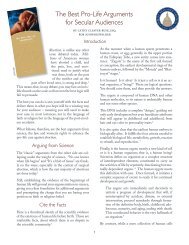The Effects of Divorce on Children - Family Research Council
The Effects of Divorce on Children - Family Research Council
The Effects of Divorce on Children - Family Research Council
Create successful ePaper yourself
Turn your PDF publications into a flip-book with our unique Google optimized e-Paper software.
<str<strong>on</strong>g>The</str<strong>on</strong>g> major issue for researchers is no l<strong>on</strong>ger to learn what the ill effects <str<strong>on</strong>g>of</str<strong>on</strong>g> divorce<br />
are, but to understand the extent <str<strong>on</strong>g>of</str<strong>on</strong>g> these effects <strong>on</strong> children and grandchildren<br />
and to identify ways <str<strong>on</strong>g>of</str<strong>on</strong>g> reversing their intergenerati<strong>on</strong>al cycle.<br />
I. <str<strong>on</strong>g>Effects</str<strong>on</strong>g> <strong>on</strong> the <strong>Family</strong>: Cyclical Brokenness<br />
A. Weakened Parent-Child Relati<strong>on</strong>ships<br />
When parents divorce each other, another sort <str<strong>on</strong>g>of</str<strong>on</strong>g> divorce occurs between the<br />
parents and their children. <str<strong>on</strong>g>The</str<strong>on</strong>g> primary effect <str<strong>on</strong>g>of</str<strong>on</strong>g> divorce (and <str<strong>on</strong>g>of</str<strong>on</strong>g> the parental<br />
c<strong>on</strong>flict that precedes the divorce) is a decline in the relati<strong>on</strong>ship between parent<br />
and child. 6 Immediately after a divorce, most parents have two sets <str<strong>on</strong>g>of</str<strong>on</strong>g> problems:<br />
their adjustment to their own intrapsychic c<strong>on</strong>flicts and to their role as a<br />
divorced parent. <str<strong>on</strong>g>The</str<strong>on</strong>g> stress <str<strong>on</strong>g>of</str<strong>on</strong>g> divorce damages the parent-child relati<strong>on</strong>ship for<br />
as many as 40 percent <str<strong>on</strong>g>of</str<strong>on</strong>g> divorced mothers. 7 <str<strong>on</strong>g>The</str<strong>on</strong>g> support they receive from home<br />
is rated much lower by children <str<strong>on</strong>g>of</str<strong>on</strong>g> divorced parents than by children from intact<br />
homes, 8 and these negative ratings become more pr<strong>on</strong>ounced by the time children<br />
are in high school 9 and college. 10<br />
<strong>Children</strong> in divorced families receive less emoti<strong>on</strong>al support, financial assistance,<br />
and practical help from their parents. 11 <str<strong>on</strong>g>Divorce</str<strong>on</strong>g>d homes show a decrease in<br />
language stimulati<strong>on</strong>, pride, affecti<strong>on</strong>, stimulati<strong>on</strong> <str<strong>on</strong>g>of</str<strong>on</strong>g> academic behavior,<br />
encouragement <str<strong>on</strong>g>of</str<strong>on</strong>g> social maturity, and warmth directed towards the children.<br />
<str<strong>on</strong>g>The</str<strong>on</strong>g> presence <str<strong>on</strong>g>of</str<strong>on</strong>g> fewer toys and games is comm<strong>on</strong>, as is an increase in physical<br />
punishment. 12 Though some studies show that parental divorce itself may not<br />
6<br />
Elizabeth Meneghan and Toby L. Parcel, “Social Sources <str<strong>on</strong>g>of</str<strong>on</strong>g> Change in <strong>Children</strong>’s Home<br />
Envir<strong>on</strong>ments: <str<strong>on</strong>g>The</str<strong>on</strong>g> <str<strong>on</strong>g>Effects</str<strong>on</strong>g> <str<strong>on</strong>g>of</str<strong>on</strong>g> Parental Occupati<strong>on</strong>al Experiences and <strong>Family</strong> C<strong>on</strong>diti<strong>on</strong>s,”<br />
Journal <str<strong>on</strong>g>of</str<strong>on</strong>g> Marriage and <strong>Family</strong> 57 (1995): 69-84.<br />
Paul R. Amato and Tamara D. Afifi, “Feeling Caught Between Parents: Adult <strong>Children</strong>’s<br />
Relati<strong>on</strong>s with Parents and Subjective Well-Being,” Journal <str<strong>on</strong>g>of</str<strong>on</strong>g> Marriage and <strong>Family</strong> 68, no. 1<br />
(2006): 231.<br />
7<br />
Judith S. Wallerstein and Joan Berlin Kelly, Surviving the Breakup: How <strong>Children</strong> and Parents<br />
Cope With <str<strong>on</strong>g>Divorce</str<strong>on</strong>g> (1980; repr., New York, NY: Basic Books, 1996), 224-225. Citati<strong>on</strong>s are<br />
from the 1996 editi<strong>on</strong>.<br />
8<br />
Jane E. Miller and Diane Davis, “Poverty History, Marital History, and Quality <str<strong>on</strong>g>of</str<strong>on</strong>g> <strong>Children</strong>’s<br />
Home Envir<strong>on</strong>ments,” Journal <str<strong>on</strong>g>of</str<strong>on</strong>g> Marriage and <strong>Family</strong> 59 (1997): 1002.<br />
9<br />
Thomas S. Parish, “Evaluati<strong>on</strong>s <str<strong>on</strong>g>of</str<strong>on</strong>g> <strong>Family</strong> by Youth: Do <str<strong>on</strong>g>The</str<strong>on</strong>g>y Vary as a Functi<strong>on</strong> <str<strong>on</strong>g>of</str<strong>on</strong>g> <strong>Family</strong><br />
Structure, Gender and Birth Order?” Adolescence 25 (1990): 354-356.<br />
10<br />
Thomas S. Parish, “Evaluati<strong>on</strong>s <str<strong>on</strong>g>of</str<strong>on</strong>g> <strong>Family</strong> as a Functi<strong>on</strong> <str<strong>on</strong>g>of</str<strong>on</strong>g> One’s <strong>Family</strong> Structure and Sex,”<br />
Perceptual and Motor Skills 66 (1988): 25-26.<br />
11<br />
Paul R. Amato and Alan Booth, A Generati<strong>on</strong> at Risk (Cambridge, MA: Harvard University<br />
Press, 1997), 69.<br />
Teresa M. Co<strong>on</strong>ey and Peter Uhlenberg, “Support from Parents Over the Life Course: <str<strong>on</strong>g>The</str<strong>on</strong>g><br />
Adult Child’s Perspective,” Social Forces 71 (1991): 63-83.<br />
12<br />
Carol E. MacKinn<strong>on</strong>, Gene H. Brody, and Zolinda St<strong>on</strong>eman, “<str<strong>on</strong>g>The</str<strong>on</strong>g> <str<strong>on</strong>g>Effects</str<strong>on</strong>g> <str<strong>on</strong>g>of</str<strong>on</strong>g> <str<strong>on</strong>g>Divorce</str<strong>on</strong>g> and<br />
Maternal Employment <strong>on</strong> the Home Envir<strong>on</strong>ments <str<strong>on</strong>g>of</str<strong>on</strong>g> Preschool <strong>Children</strong>,” Child Development<br />
53 (1982): 1392-1399.<br />
3




